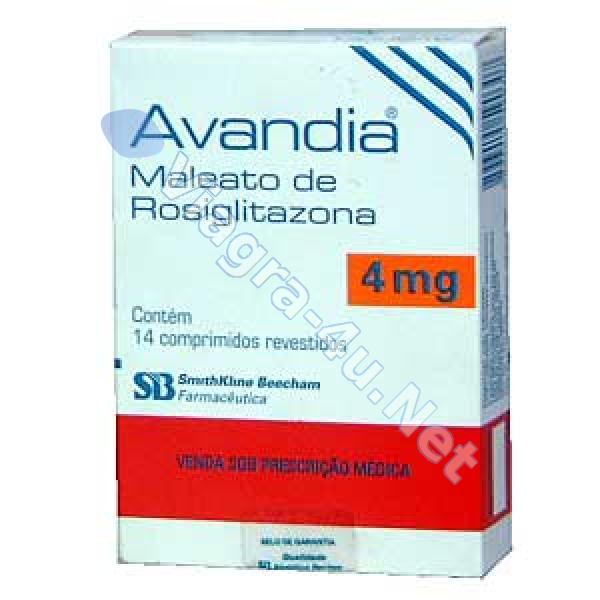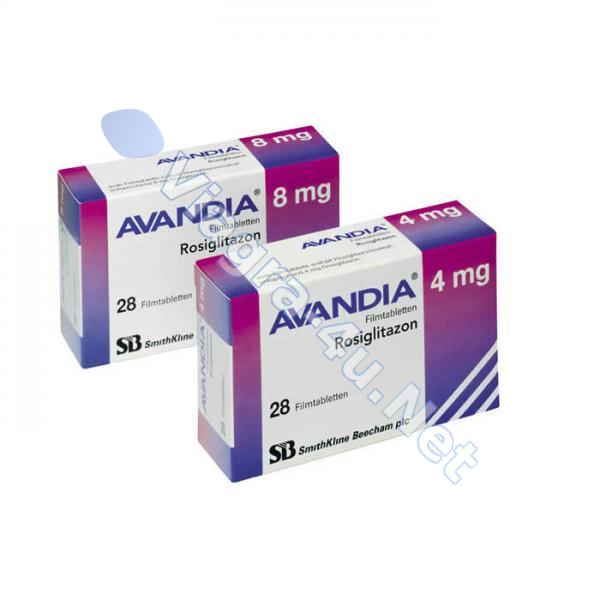


Avandia 2mg se indica en el tratamiento de la diabetes mellitus tipo 2, así como en la disminución de su ciclo progresivo. Avandia 2mg como monoterapia está indicado junto con la dieta y el ejercicio para mejorar el control glucémico en pacientes con diabetes mellitus tipo 2.
Avandia is used for:
Treating type 2 diabetes in certain patients. It is used along with diet and exercise. It may be used alone or with other antidiabetic medicines. Avandia is a thiazolidinedione antidiabetic. It lowers blood sugar by making the cells of the body more sensitive to the action of insulin.
Do NOT use Avandia if:
• you are allergic to any ingredient in Avandia
• you have moderate to severe heart failure
• you have type 1 diabetes
• you have a history of liver problems, including jaundice (yellowing of the skin or eyes), during therapy with a similar medicine called troglitazone
• you are taking nitrates (eg, nitroglycerin) or using insulin
Contact your doctor or health care provider right away if any of these apply to you.
Before using Avandia:
Some medical conditions may interact with Avandia . Tell your doctor or pharmacist if you have any medical conditions, especially if any of the following apply to you:
• if you are pregnant, planning to become pregnant, or are breast-feeding
• if you are taking any prescription or nonprescription medicine, herbal preparation, or dietary supplement
• if you have allergies to medicines, foods, or other substances
• if you have diabetic ketoacidosis (a severe problem associated with diabetes)
• if you have a history of liver problems, abnormal liver function tests, heart problems (eg, congestive heart failure), or eye or vision problems
• if you have swelling problems (edema)
Some MEDICINES MAY INTERACT with Avandia . Tell your health care provider if you are taking any other medicines, especially any of the following:
• Insulin or nitrates (eg, nitroglycerin) because the risk of heart problems may be increased
• Gemfibrozil or oral antidiabetic medicines (eg, glipizide) because the risk of low blood sugar may be increased
• Rifampin because it may decrease Avandia 's effectiveness, resulting in high blood sugar
• Anticoagulants (eg, warfarin) because their effectiveness may be decreased or the risk of their side effects may be increased by Avandia
This may not be a complete list of all interactions that may occur. Ask your health care provider if Avandia may interact with other medicines that you take. Check with your health care provider before you start, stop, or change the dose of any medicine.
How to use Avandia:
Use Avandia as directed by your doctor. Check the label on the medicine for exact dosing instructions.
• Avandia comes with an extra patient information sheet called a Medication Guide. Read it carefully. Read it again each time you get Avandia refilled.
• Take Avandia by mouth with or without food.
• Continue to take Avandia even if you feel well. Do not miss any doses. Taking Avandia at the same time each day will help you remember to take it.
• If you miss a dose of Avandia , take it as soon as possible. If it almost time for your next dose, skip the missed dose and go back to your regular dosing schedule. Do not take 2 doses at once.
Ask your health care provider any questions you may have about how to use Avandia.
Important safety information:
• Avandia may cause dizziness. This effect may be worse if you take it with alcohol or certain medicines. Use Avandia with caution. Do not drive or perform other possibly unsafe tasks until you know how you react to it.
• Carry an ID card at all times that says you have diabetes.
• Proper diet and exercise are important for best results with Avandia . Follow the diet and exercise program given to you by your health care provider.
• It may take 2 weeks for Avandia to start to lower your blood sugar. It may take up to 3 months to see the full effect of Avandia . If your symptoms do not get better within 2 weeks or if they get worse, check with your doctor.
• Check your blood sugar levels as directed by your doctor. If they are often higher than they should be and you take Avandia exactly as prescribed, tell your doctor.
• It may be harder to control your blood sugar during times of stress such as fever, infection, injury, or surgery. Talk with your doctor about how to control your blood sugar if any of these occur. Do not change the dose of your medicine without checking with your doctor.
• Do NOT take more than the recommended dose without checking with your doctor.
• Avandia may cause low blood sugar levels when it is used along with insulin or other oral diabetic medicines. Low blood sugar may make you anxious, sweaty, weak, dizzy, drowsy, or faint. It may also make your heart beat faster; make your vision change; give you a headache, chills, or tremors; or make you more hungry. It is a good idea to carry a reliable source of glucose (eg, tablets or gel) to treat low blood sugar. If this is not available, you should eat or drink a quick source of sugar like table sugar, honey, candy, orange juice, or non-diet soda. This will raise your blood sugar level quickly. Tell your doctor right away if this happens. To prevent low blood sugar, eat meals at the same time each day and do not skip meals.
• Avandia may cause ovulation in women who have not reached menopause but do not ovulate. Be sure to use effective birth control while using Avandia.
• Tell your doctor or dentist that you take Avandia before you receive any medical or dental care, emergency care, or surgery.
• An increased incidence of bone fracture has been reported in women who take Avandia . Tell your doctor if you have a history of bone fracture, low calcium intake, or weak bones (eg, osteoporosis). Tell your doctor right away if you experience any unusual bone pain.
• Lab tests, including fasting blood sugar, hemoglobin A1c, eye examinations, and liver function, may be performed while you use Avandia . These tests may be used to monitor your condition or check for side effects. Be sure to keep all doctor and lab appointments.
• Avandia should be used with extreme caution in CHILDREN; safety and effectiveness in children have not been confirmed.
• PREGNANCY and BREAST-FEEDING: If you become pregnant, contact your doctor. You will need to discuss the benefits and risks of using Avandia while you are pregnant. It is not known if Avandia is found in breast milk. Do not breast-feed while taking Avandia.
Possible side effects of Avandia:
All medicines may cause side effects, but many people have no, or minor, side effects. Check with your doctor if any of these most COMMON side effects persist or become bothersome:
• Headache; weight gain.
Seek medical attention right away if any of these SEVERE side effects occur:
• Severe allergic reactions (rash; hives; itching; difficulty breathing; tightness in the chest; swelling of the mouth, face, lips, or tongue); blurred vision or other vision changes; chest pain; fainting; numbness of an arm or leg; severe headache, stomach pain, or vomiting; symptoms of heart failure (eg, shortness of breath; sudden unexplained weight gain; swelling of the hands, ankles, or feet); symptoms of liver problems (eg, dark urine; yellowing of the skin or eyes; unexplained nausea, vomiting, or loss of appetite; stomach pain); symptoms of low blood sugar (eg, anxiety, increased sweating, dizziness or drowsiness, headache, chills, tremors, increased hunger); unusual bone pain; unusual tiredness or weakness.
This is not a complete list of all side effects that may occur. If you have questions or need medical advice about side effects, contact your doctor or health care provider.
Proper storage of Avandia:
Store Avandia at 77 degrees F (25 degrees C). Brief storage at temperatures between 59 and 86 degrees F (15 and 30 degrees C) is permitted. Do not store Avandia in the bathroom. Store away from heat, moisture, and light. Keep this medicine out of the reach of children and away from pets